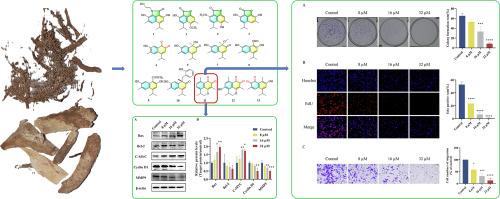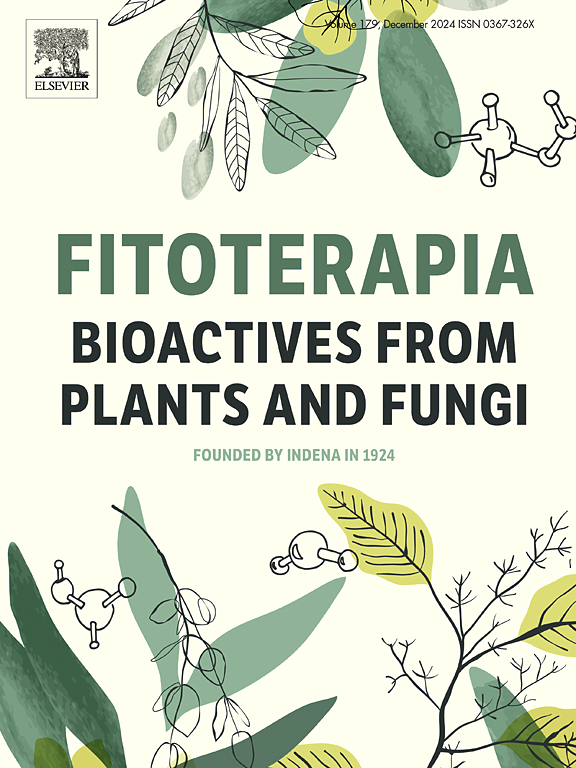Cadinane sesquiterpenes from Alangium platanifolium: structural elucidation and anti-colorectal cancer biological evaluation
IF 2.6
3区 医学
Q3 CHEMISTRY, MEDICINAL
引用次数: 0
Abstract
A total of thirteen cadinane sesquiterpenes, including three previously undescribed compounds (1–3) and ten known analogues (4–13), were isolated from the roots of Alangium platanifolium through various phytochemical separation techniques, including silica gel column chromatography. The compounds were structurally elucidated using nuclear magnetic resonance (NMR) and high-resolution electrospray ionization mass spectrometry (HR-ESI-Q-TOF-MS). The anti-proliferative activities of these compounds were assessed against HeLa and SW620 cell lines using the CCK-8 assay. Among them, mansonone E (11) demonstrated notable cytotoxicity against SW620 cells, with an IC50 of 15.69 ± 0.56 μM. Colony formation and EdU incorporation assays confirmed the significant inhibitory impact of mansonone E on SW620 cell proliferation. Transwell migration assays demonstrated that mansonone E notably inhibited the migration of SW620 cells. Western blot analysis revealed that mansonone E decreases Bcl-2, Cyclin D1, and MMP9 levels, while increases Bax and C-MYC expression. In conclusion, mansonone E effectively suppressed colorectal cancer cell proliferation and migration, potentially by modulating key proteins like Bcl-2/Bax, Cyclin D1, and C-MYC. This study provides experimental evidence for mansonone E as a potential candidate for colorectal cancer treatment and provides a foundation for the application of Alangium platanifolium in colorectal cancer therapy.

桔黄中二丁烷倍半萜的结构解析及抗结直肠癌生物学评价。
通过硅胶柱层析等多种植物化学分离技术,从桔花根中分离得到了13个癸烷倍半萜,其中包括3个未被描述的化合物(1-3)和10个已知的类似物(4-13)。利用核磁共振(NMR)和高分辨率电喷雾电离质谱(HR-ESI-Q-TOF-MS)对化合物进行了结构鉴定。采用CCK-8法测定这些化合物对HeLa和SW620细胞株的抗增殖活性。其中,mansonone E(11)对SW620细胞具有显著的细胞毒性,IC50值为15.69 ± 0.56 μM。菌落形成和EdU掺入实验证实了曼森酮E对SW620细胞增殖的显著抑制作用。Transwell迁移实验表明,曼森酮E显著抑制SW620细胞的迁移。Western blot分析显示,曼森酮E降低Bcl-2、Cyclin D1和MMP9水平,同时增加Bax和C-MYC的表达。综上所述,mansonone E可能通过调节Bcl-2/Bax、Cyclin D1和C-MYC等关键蛋白,有效抑制结直肠癌细胞的增殖和迁移。本研究为曼松酮E作为结直肠癌治疗的潜在候选者提供了实验证据,为桔黄在结直肠癌治疗中的应用奠定了基础。
本文章由计算机程序翻译,如有差异,请以英文原文为准。
求助全文
约1分钟内获得全文
求助全文
来源期刊

Fitoterapia
医学-药学
CiteScore
5.80
自引率
2.90%
发文量
198
审稿时长
1.5 months
期刊介绍:
Fitoterapia is a Journal dedicated to medicinal plants and to bioactive natural products of plant origin. It publishes original contributions in seven major areas:
1. Characterization of active ingredients of medicinal plants
2. Development of standardization method for bioactive plant extracts and natural products
3. Identification of bioactivity in plant extracts
4. Identification of targets and mechanism of activity of plant extracts
5. Production and genomic characterization of medicinal plants biomass
6. Chemistry and biochemistry of bioactive natural products of plant origin
7. Critical reviews of the historical, clinical and legal status of medicinal plants, and accounts on topical issues.
 求助内容:
求助内容: 应助结果提醒方式:
应助结果提醒方式:


